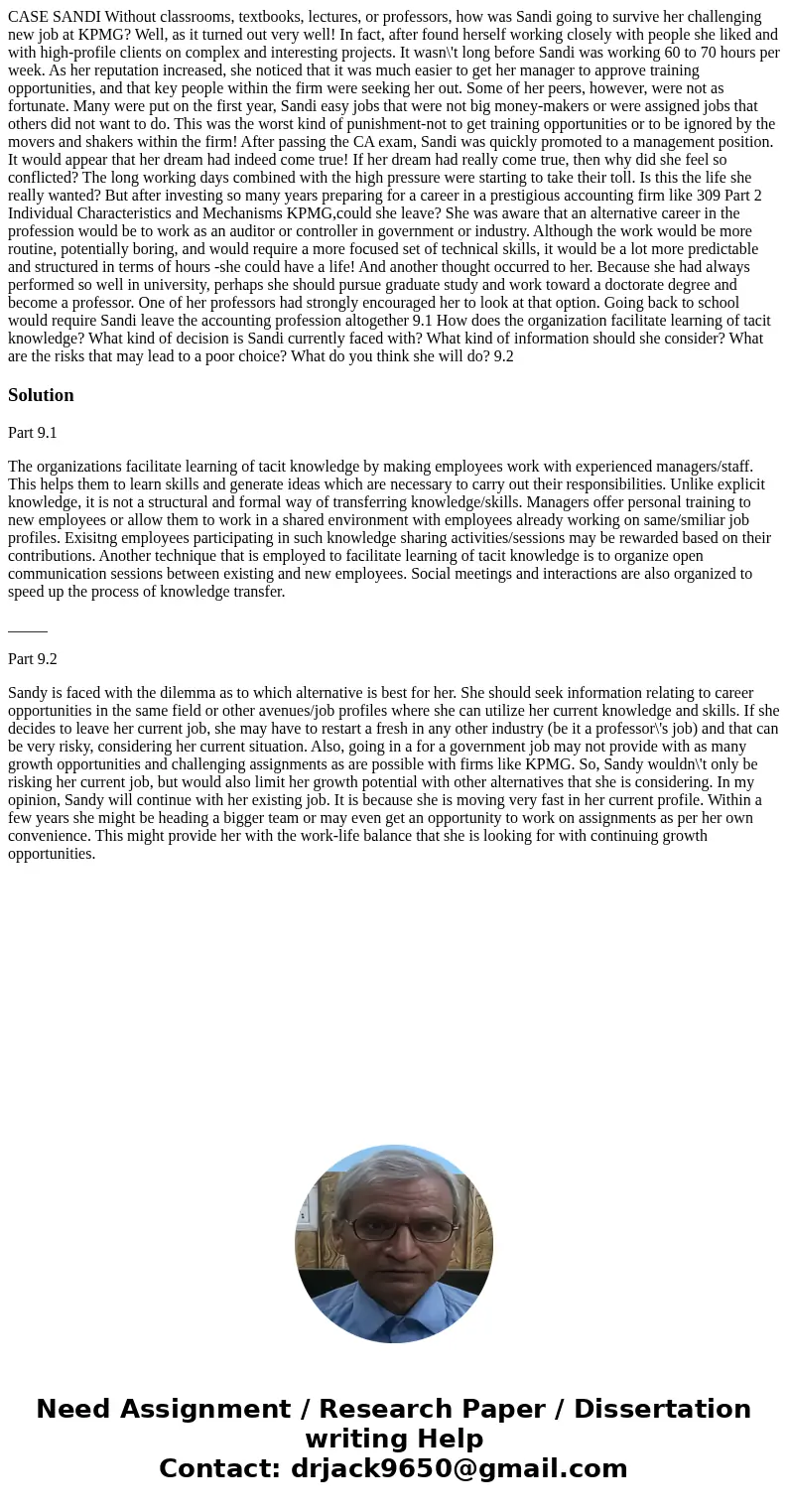CASE SANDI Without classrooms, textbooks, lectures, or professors, how was Sandi going to survive her challenging new job at KPMG? Well, as it turned out very well! In fact, after found herself working closely with people she liked and with high-profile clients on complex and interesting projects. It wasn\'t long before Sandi was working 60 to 70 hours per week. As her reputation increased, she noticed that it was much easier to get her manager to approve training opportunities, and that key people within the firm were seeking her out. Some of her peers, however, were not as fortunate. Many were put on the first year, Sandi easy jobs that were not big money-makers or were assigned jobs that others did not want to do. This was the worst kind of punishment-not to get training opportunities or to be ignored by the movers and shakers within the firm! After passing the CA exam, Sandi was quickly promoted to a management position. It would appear that her dream had indeed come true! If her dream had really come true, then why did she feel so conflicted? The long working days combined with the high pressure were starting to take their toll. Is this the life she really wanted? But after investing so many years preparing for a career in a prestigious accounting firm like 309 Part 2 Individual Characteristics and Mechanisms KPMG,could she leave? She was aware that an alternative career in the profession would be to work as an auditor or controller in government or industry. Although the work would be more routine, potentially boring, and would require a more focused set of technical skills, it would be a lot more predictable and structured in terms of hours -she could have a life! And another thought occurred to her. Because she had always performed so well in university, perhaps she should pursue graduate study and work toward a doctorate degree and become a professor. One of her professors had strongly encouraged her to look at that option. Going back to school would require Sandi leave the accounting profession altogether 9.1 How does the organization facilitate learning of tacit knowledge? What kind of decision is Sandi currently faced with? What kind of information should she consider? What are the risks that may lead to a poor choice? What do you think she will do? 9.2
Part 9.1
The organizations facilitate learning of tacit knowledge by making employees work with experienced managers/staff. This helps them to learn skills and generate ideas which are necessary to carry out their responsibilities. Unlike explicit knowledge, it is not a structural and formal way of transferring knowledge/skills. Managers offer personal training to new employees or allow them to work in a shared environment with employees already working on same/smiliar job profiles. Exisitng employees participating in such knowledge sharing activities/sessions may be rewarded based on their contributions. Another technique that is employed to facilitate learning of tacit knowledge is to organize open communication sessions between existing and new employees. Social meetings and interactions are also organized to speed up the process of knowledge transfer.
_____
Part 9.2
Sandy is faced with the dilemma as to which alternative is best for her. She should seek information relating to career opportunities in the same field or other avenues/job profiles where she can utilize her current knowledge and skills. If she decides to leave her current job, she may have to restart a fresh in any other industry (be it a professor\'s job) and that can be very risky, considering her current situation. Also, going in a for a government job may not provide with as many growth opportunities and challenging assignments as are possible with firms like KPMG. So, Sandy wouldn\'t only be risking her current job, but would also limit her growth potential with other alternatives that she is considering. In my opinion, Sandy will continue with her existing job. It is because she is moving very fast in her current profile. Within a few years she might be heading a bigger team or may even get an opportunity to work on assignments as per her own convenience. This might provide her with the work-life balance that she is looking for with continuing growth opportunities.

 Homework Sourse
Homework Sourse